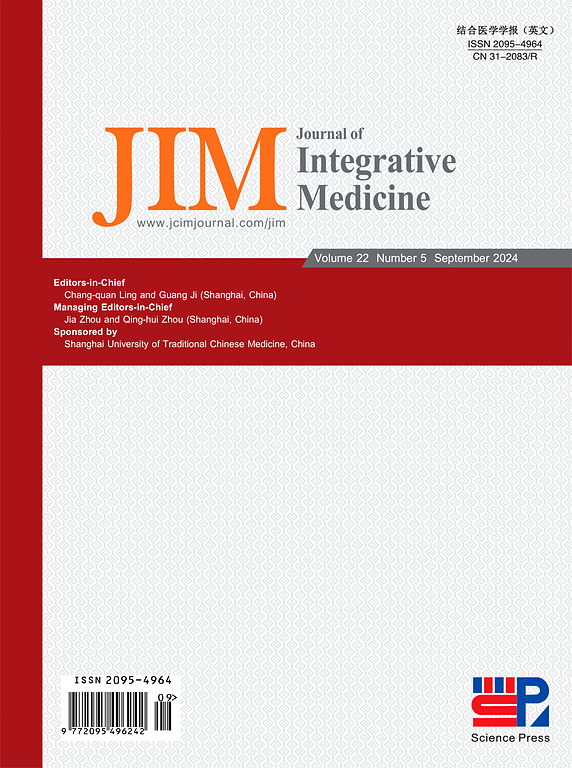Integrating traditional Chinese medicine constitutions into insomnia management: Findings from a cross-sectional study
IF 4
2区 医学
Q1 INTEGRATIVE & COMPLEMENTARY MEDICINE
引用次数: 0
Abstract
Objective
The concept of constitution in traditional Chinese medicine (TCM) has been increasingly recognized as a crucial factor in both the prevention and treatment of insomnia. However, rigorous statistical evidence on the correlation between TCM constitutions—particularly mixed constitutions—and insomnia disorder remains limited. This study aimed to investigate the association between specific TCM constitutions and insomnia disorder.
Methods
A cross-sectional study was conducted at the Department of Preventive Medicine, Yueyang Hospital of Integrated Traditional Chinese and Western Medicine, Shanghai, from November 2022 to December 2023. TCM constitutions were assessed using the Constitution in Chinese Medicine Questionnaire. Insomnia disorder was diagnosed by experienced internal medicine physicians according to the criteria of the International Classification of Sleep Disorders, Third Edition. A total of 1065 eligible participants (242 with insomnia disorder and 823 controls) were included in the final analysis.
Results
Among the participants, 862 (80.94%) exhibited biased constitutions, with 75.30% of these having mixed constitutions. Logistic regression analysis revealed a negative association between the gentleness constitution and insomnia disorder, whereas qi-deficiency, yang-deficiency, phlegm-dampness and qi-depression constitutions were positively associated with insomnia disorder. These associations remained significant after adjusting for potential confounders and were further validated through sensitivity analysis using propensity score matching.
Conclusion
Significant associations between TCM constitutions and insomnia disorder were demonstrated. Future research should further investigate these relationships and explore the underlying mechanisms through rigorous longitudinal and interventional studies to improve understanding and clinical applications.
Please cite this article as: Han Y, Wang Y, Shi MY, Liu Y, Cheng XD, Zhou Y. Integrating traditional Chinese medicine constitutions into insomnia management: Findings from a cross-sectional study. J Integr Med. 2025; 23(4): 382–389.
中医体质纳入失眠管理:一项横断面研究的结果。
目的:中医的体质概念在预防和治疗失眠中越来越被认为是一个至关重要的因素。然而,关于中医体质——尤其是混合体质——与失眠之间相关性的严格统计证据仍然有限。本研究旨在探讨特定中医体质与失眠的关系。方法:横断面研究于2022年11月- 2023年12月在上海市岳阳中西医结合医院预防内科进行。采用《中医体质问卷》对中医体质进行评估。失眠由经验丰富的内科医生根据《国际睡眠障碍分类》第三版的标准进行诊断。共有1065名符合条件的参与者(242名失眠患者和823名对照组)被纳入最终分析。结果:在参与者中,862人(80.94%)表现出偏见体质,其中75.30%表现出混合体质。Logistic回归分析显示,温和体质与失眠呈负相关,气虚体质、阳虚体质、痰湿体质和气郁体质与失眠呈正相关。在调整潜在混杂因素后,这些关联仍然显著,并通过使用倾向评分匹配的敏感性分析进一步验证。结论:中医体质与失眠有显著相关性。未来的研究应进一步研究这些关系,并通过严格的纵向和介入性研究探索潜在的机制,以提高认识和临床应用。本文署名:韩颖,王颖,石梅,刘颖,程晓东,周颖。将中医体质纳入失眠管理:一项横断面研究的结果。集成医学[J];打印前Epub。
本文章由计算机程序翻译,如有差异,请以英文原文为准。
求助全文
约1分钟内获得全文
求助全文
来源期刊

Journal of Integrative Medicine-Jim
Medicine-Complementary and Alternative Medicine
CiteScore
9.20
自引率
4.20%
发文量
3319
期刊介绍:
The predecessor of JIM is the Journal of Chinese Integrative Medicine (Zhong Xi Yi Jie He Xue Bao). With this new, English-language publication, we are committed to make JIM an international platform for publishing high-quality papers on complementary and alternative medicine (CAM) and an open forum in which the different professions and international scholarly communities can exchange views, share research and their clinical experience, discuss CAM education, and confer about issues and problems in our various disciplines and in CAM as a whole in order to promote integrative medicine.
JIM is indexed/abstracted in: MEDLINE/PubMed, ScienceDirect, Emerging Sources Citation Index (ESCI), Scopus, Embase, Chemical Abstracts (CA), CAB Abstracts, EBSCO, WPRIM, JST China, Chinese Science Citation Database (CSCD), and China National Knowledge Infrastructure (CNKI).
JIM Editorial Office uses ThomsonReuters ScholarOne Manuscripts as submitting and review system (submission link: http://mc03.manuscriptcentral.com/jcim-en).
JIM is published bimonthly. Manuscripts submitted to JIM should be written in English. Article types include but are not limited to randomized controlled and pragmatic trials, translational and patient-centered effectiveness outcome studies, case series and reports, clinical trial protocols, preclinical and basic science studies, systematic reviews and meta-analyses, papers on methodology and CAM history or education, conference proceedings, editorials, commentaries, short communications, book reviews, and letters to the editor.
Our purpose is to publish a prestigious international journal for studies in integrative medicine. To achieve this aim, we seek to publish high-quality papers on any aspects of integrative medicine, such as acupuncture and traditional Chinese medicine, Ayurveda medicine, herbal medicine, homeopathy, nutrition, chiropractic, mind-body medicine, taichi, qigong, meditation, and any other modalities of CAM; our commitment to international scope ensures that research and progress from all regions of the world are widely covered. These ensure that articles published in JIM have the maximum exposure to the international scholarly community.
JIM can help its authors let their papers reach the widest possible range of readers, and let all those who share an interest in their research field be concerned with their study.
 求助内容:
求助内容: 应助结果提醒方式:
应助结果提醒方式:


